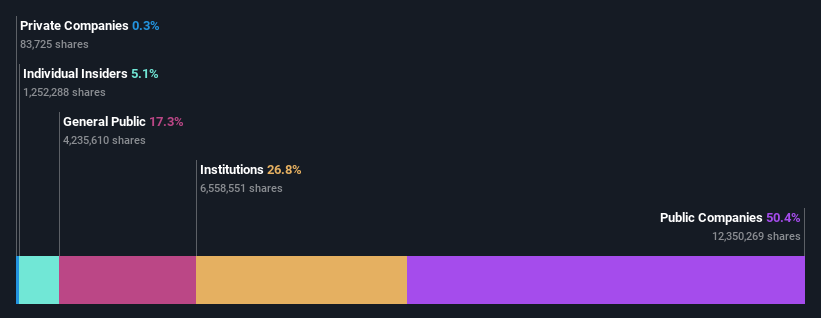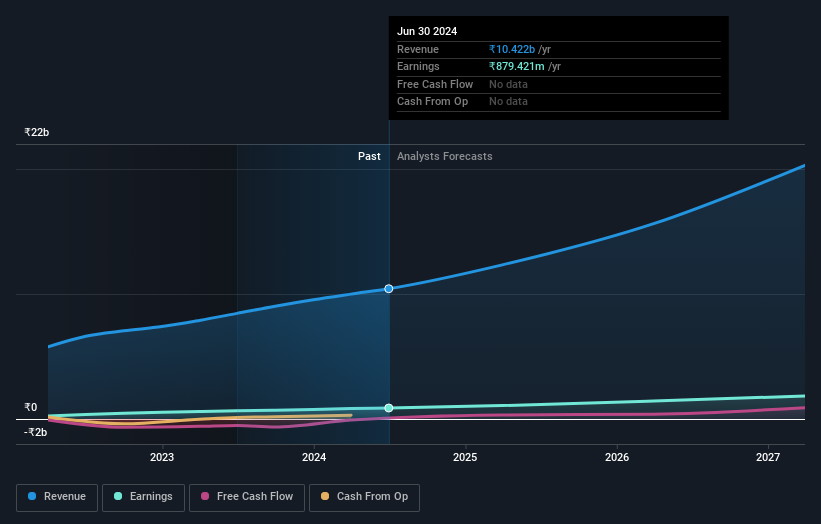- India
- /
- Specialty Stores
- /
- NSEI:ETHOSLTD
Ethos Limited's (NSE:ETHOSLTD) 7.6% loss last week hit both individual investors who own 50% as well as institutions

Key Insights
- Ethos' significant public companies ownership suggests that the key decisions are influenced by shareholders from the larger public
- KDDL Limited owns 50% of the company
- Insiders have been selling lately
If you want to know who really controls Ethos Limited (NSE:ETHOSLTD), then you'll have to look at the makeup of its share registry. We can see that public companies own the lion's share in the company with 50% ownership. That is, the group stands to benefit the most if the stock rises (or lose the most if there is a downturn).
While institutions who own 27% came under pressure after market cap dropped to ₹67b last week,public companies took the most losses.
In the chart below, we zoom in on the different ownership groups of Ethos.
See our latest analysis for Ethos

What Does The Institutional Ownership Tell Us About Ethos?
Many institutions measure their performance against an index that approximates the local market. So they usually pay more attention to companies that are included in major indices.
Ethos already has institutions on the share registry. Indeed, they own a respectable stake in the company. This implies the analysts working for those institutions have looked at the stock and they like it. But just like anyone else, they could be wrong. It is not uncommon to see a big share price drop if two large institutional investors try to sell out of a stock at the same time. So it is worth checking the past earnings trajectory of Ethos, (below). Of course, keep in mind that there are other factors to consider, too.

Hedge funds don't have many shares in Ethos. The company's largest shareholder is KDDL Limited, with ownership of 50%. This essentially means that they have extensive influence, if not outright control, over the future of the corporation. With 8.0% and 5.0% of the shares outstanding respectively, ICICI Prudential Asset Management Company Limited and Invesco Ltd. are the second and third largest shareholders.
Researching institutional ownership is a good way to gauge and filter a stock's expected performance. The same can be achieved by studying analyst sentiments. While there is some analyst coverage, the company is probably not widely covered. So it could gain more attention, down the track.
Insider Ownership Of Ethos
The definition of company insiders can be subjective and does vary between jurisdictions. Our data reflects individual insiders, capturing board members at the very least. Management ultimately answers to the board. However, it is not uncommon for managers to be executive board members, especially if they are a founder or the CEO.
I generally consider insider ownership to be a good thing. However, on some occasions it makes it more difficult for other shareholders to hold the board accountable for decisions.
We can see that insiders own shares in Ethos Limited. In their own names, insiders own ₹3.4b worth of stock in the ₹67b company. It is good to see some investment by insiders, but it might be worth checking if those insiders have been buying.
General Public Ownership
The general public-- including retail investors -- own 17% stake in the company, and hence can't easily be ignored. While this group can't necessarily call the shots, it can certainly have a real influence on how the company is run.
Public Company Ownership
We can see that public companies hold 50% of the Ethos shares on issue. This may be a strategic interest and the two companies may have related business interests. It could be that they have de-merged. This holding is probably worth investigating further.
Next Steps:
While it is well worth considering the different groups that own a company, there are other factors that are even more important. Be aware that Ethos is showing 2 warning signs in our investment analysis , you should know about...
If you would prefer discover what analysts are predicting in terms of future growth, do not miss this free report on analyst forecasts.
NB: Figures in this article are calculated using data from the last twelve months, which refer to the 12-month period ending on the last date of the month the financial statement is dated. This may not be consistent with full year annual report figures.
Valuation is complex, but we're here to simplify it.
Discover if Ethos might be undervalued or overvalued with our detailed analysis, featuring fair value estimates, potential risks, dividends, insider trades, and its financial condition.
Access Free AnalysisHave feedback on this article? Concerned about the content? Get in touch with us directly. Alternatively, email editorial-team (at) simplywallst.com.
This article by Simply Wall St is general in nature. We provide commentary based on historical data and analyst forecasts only using an unbiased methodology and our articles are not intended to be financial advice. It does not constitute a recommendation to buy or sell any stock, and does not take account of your objectives, or your financial situation. We aim to bring you long-term focused analysis driven by fundamental data. Note that our analysis may not factor in the latest price-sensitive company announcements or qualitative material. Simply Wall St has no position in any stocks mentioned.
About NSEI:ETHOSLTD
High growth potential with excellent balance sheet.
Similar Companies
Market Insights
Community Narratives



